- Home
- Alex Archer
Forbidden City Page 2
Forbidden City Read online
Page 2
Huangfu was in good shape, as well. Annja knew that because the pace she'd set had been an aggressive one. The man hadn't complained or fallen behind. When she'd realized what she was doing and that she should have been going more slowly, she'd expected to find him out of breath and struggling to keep up. Instead, he'd been fine.
"I have to be in good shape in my profession." Annja rethought that. "Actually, I don't have to be, but I want to be. It comes in handy." Especially when someone's trying to kill me. That had occurred far too much lately. Ever since she'd found the last piece of Joan of Arc's sword in France.
Before that, before Roux and Garin had entered her life, Annja had never once considered the possibility that she might ever have been connected to Joan of Arc. The sword, or maybe it was Annja herself these days, seemed to draw trouble like a magnet.
That was the downside, however. The upside was that whatever karma she presently lived under was taking her places she'd only dreamed of.
"I didn't think television people actually needed to exercise. Only that they look so." Huangfu smiled, showing that he meant no disrespect.
"Television isn't exactly my profession." Even though she'd been hosting spots on Chasing History's Monsters for a while now, Annja still felt embarrassed. But doing the show allowed her to go more places than she would have been able to on her own as an archaeologist. Television shows tended to be better funded than the universities that would have hired her as a professor.
Likewise, the show had given Annja more international recognition than the hundreds of articles, monographs, and couple of books she'd written. She knew many of those publishers wouldn't have considered her work if she hadn't had the large underground fan base Chasing History's Monsters had provided. And more of those published pieces had been for laymen than for professionals.
Unfortunately, the recognition was a double-edged sword. Many people tended to think of her as a television personality first and an archaeologist second. Annja never thought of herself that way. What she often gained in access she lost in credibility.
"It wasn't the television personality I asked to help me – it was the archaeologist," Huangfu said.
Annja smiled a little. She still wasn't sure if Huangfu was flirting with her or simply being disarming. She was wrong about that more often than not, too. "Thank you," she finally said.
They walked for a time. Annja took out the GPS device in her coat pocket and checked their location.
"Do you get many offers to do something like this?" Huangfu opened his canteen and took a sip of water.
"To go looking for someone's ancestors?" Annja replaced the location device and uncapped her own canteen. "I do get a number of offers."
"Do you answer them all?"
"No. I wouldn't have time," Annja replied.
Huangfu smiled. "Then what was it about my offer that interested you?"
"The family heirloom you're looking for. That interested me."
"Because it is a – " Huangfu paused, reflecting. English was not his native language, and he wasn't as skilled as Annja had expected for someone who worked in international trade circles. He shrugged and shook his head. "I can't remember what you called it."
"I was fascinated because of the Scythian art," she said as she started walking again.
"Yes. You said the Scythians were a nomadic people."
"They were. In all probability, they were Iranian, but they were known by different names. The Assyrians knew them as the Ishkuzai. The Greek historian Herodotus of Halicarnassus described them as a tribe called the Kimmerioi, which was expelled by the Ishkuzai. The Kimmerioi were also known as Cimmerians, Gimirru in the histories left by the Assyrians." Annja smiled. "Some people think Robert E. Howard borrowed the Cimmerian culture for his hero, Conan the Barbarian."
Huangfu shook his head. "I don't know those names. My ancestors were Chinese." The words came sharply, edged with barely concealed rebuke.
Evidently Huangfu was, if not somewhat prejudicial, somewhat race conscious. Annja was aware that a number of Asian cultures looked down on each other. Regionalism divided civilization as surely as skin color, religion, and wealth.
"I didn't mean to infer that they weren't," she said.
For just a moment Annja wished she'd passed on the offer to act as guide for Huangfu. She'd spoken the truth when she'd said she regularly got offers to investigate all sorts of esoterica people thought might end up as an episode of Chasing History's Monsters.
If it hadn't been for the Scythian art, she'd have passed on this. Looking for dead ancestors didn't make her Top Ten List.
"The Scythian people traded with the Chinese beginning in the eighth century," Annja went on. "Probably before that. But archaeologists and historians have been able to track the gold trade to that time period. All I was suggesting was that the design you found in your ancestor's journals might be older than you think it is."
Huangfu nodded, mollified to a degree. "Ah, I see. You think helping me find my ancestor might give you more information about the Scythian people."
"I hope so. It would be a coup if I do. I hope I don't sound insensitive."
"Nonsense. I'm here for a man I've never met. If it weren't for my grandfather, I might not be here at all. Are these people you hope to discover more about important?"
The grade went down for a while and became a minefield of broken rock and low brush. "There is a lot we don't know about the Scythians. Located as they were in Central Asia, trading with China, Greece, what is now Eastern Europe, Pakistan and Kazakhstan – probably other nations, as well – there's a wealth of history that archaeologists, historians, and linguists are missing."
Annja took another GPS reading, then corrected their course. She'd confirmed the directions she'd gotten over the Internet with the local Ranger station and with the people in Georgetown, which was a small town only a few miles to the west.
"What do you hope to find?" Huangfu asked.
"The same thing that you do. Some proof that your ancestor was – " Annja stopped herself from saying murdered in Volcanoville just in time " – here."
Annja followed a small stream through the fringe of the Eldorado National Forest. According to her map, they weren't far from Otter Creek. Paymaster Mine Road was supposed to be only a short distance ahead.
Tall pines mixed with assorted fir trees. All of them filled the air with strong scents. Sunlight painted narrow slits on the ground. Powdered snow covered patches of the ground. Squirrels and birds met the spring's challenge, foraging for food in the trees, as well as on the ground.
"He is here." Huangfu's face looked cold and solemn. "I intend to bring my ancestor's bones home, if I am able, and see him properly laid to rest. It is my grandfather's wish to gather all of our family that we may find."
Scanning through the forest, Annja found the trail she thought they wanted. The trail rose again with the land.
Everything is uphill out here, she thought.
The park rangers she'd talked to over breakfast in Georgetown had assured Annja the path she planned to trace was an arduous one. Only hikers, horses and bicycles were allowed into the protected areas.
The muddy land was sloughing away under the melting snow. Rainfall for days had turned the ground soft in places. They'd have struggled on bikes and Huangfu had said he wasn't a horseman so Annja had elected to walk to the location.
"Are we close?" Huangfu asked.
"I believe so. Another mile or so should put us there." Annja kept walking.
Volcanoville was one of the hundreds of towns and mining camps that had sprung up in California after James W. Marshall, an employee of John Sutter's lumber mill, discovered gold flecks in the tail race in January of 1848. By the end of that year, word had spread and hundreds of thousands of people from around the world had flocked to the most recent member of the United States.
The mining camps and towns had risen up like dandelions, springing full-born almost overnight, then dying in the same qui
ck fashion when the gold ran out or was never found. Hell Roaring Diggings, Whiskey Flat, Loafer's Hollow, and others had each left behind something of a history in the area. But separating the true stories from those that had been embroidered later, or from the lies they'd been mixed with from the beginning, was almost impossible. As with any history, murder, betrayal, success and failure were all part of the tapestry.
Huangfu gazed at the ramshackle buildings that stood under a thick canopy of trees. Many of the trees showed signs of repeated lightning strikes. Broken limbs, shattered trunks, and places bare of bark were scattered around the site.
Not exactly a place to inspire hope, Annja thought as she turned to Huangfu. "It's not as bad as it looks."
The man offered her a faint smile. "That's good. Because at the moment it looks impossible."
"If we were just going off the journal you found, maybe it would be. Fortunately the California Historical Society, as well as dozens of other branches and genealogists in the area, collected stories, journals, and newspapers."
"I trust your expertise in this matter." Huangfu smiled. "That's why I hoped you would help me."
Annja slid out of her backpack and placed it beside the nearest building. The wind picked up and caused the branches to rattle against the roof. No trace of paint remained on the weathered boards. It was possible the exterior of the building had never been painted.
Working quickly, she paced off the dimensions of the buildings. Most of them appeared to have been constructed roughly the same. She guessed that the building she was searching for would be similar. When she finished, she returned to the backpack.
Huangfu didn't say a word.
Crouching, her back against the building, she took a bound journal from the backpack, as well as two energy bars, offering one of them to Huangfu. The man took the snack and crouched beside her.
"What's that?" He pointed at the book.
"A journal I made for the search we're going to conduct here."
The journal contained hand-drawn maps Annja had created from topographical surveys she'd found of the Volcanoville area, as well as ones she'd found in newspapers and letters collected in the historical societies she'd visited. Tabs separated sections on known facts, rumors, and stories she'd gleaned from her research. All of the notes were handwritten, and she'd made the sketches, as well.
"You have maps?" Huangfu sounded doubtful.
"I made them, based on geological surveys of the area, as well as stories I found. The forest and the stream, they're there in the right places. The map of the town is purely guesswork."
"I thought you'd arrived in Georgetown only this morning."
"I did." Annja smiled at him. "The Internet is a wonderful tool."
"You do this for all of your projects?"
"When I can. I like to have an idea of what I'm getting into before I arrive. Usually time at dig sites is limited. You have to know what you're looking for and where to look for it. Not all nations welcome archaeologists with open arms." Annja flipped through the maps she'd created. "A lot of that has to do with the fact that in the early twentieth century a number of archaeologists served as spies for the Western world."
Huangfu laughed. "Have you ever been a spy, Miss Creed?"
"No," Annja said flatly.
"Would you be one if you were asked?"
"I guess it would depend on the circumstances. That's not what I'm about. I'm an archaeologist." Annja looked around at the buildings, trying to see through the present into the past that had existed over a hundred years ago.
Huangfu drank water from his canteen and sat silently. From the man's relaxed posture, Annja believed he could have sat that way for hours. She hadn't yet gotten a fix on him and that left her feeling a little unsettled.
When she'd first connected with Huangfu over the Internet and then the phone, Annja had guessed he was a corporate worker. But from the money involved in his quest – and the fact that he'd generously arranged her flight out and her bed-and-breakfast accommodations in Georgetown – she'd figured he was near the top tier. A background check on him had confirmed that Huangfu Cao worked for Ngai Enterprises, a Shanghai-based international pharmaceutical company.
Bart McGilley, the New York homicide detective who was one of Annja's closest friends and who had done the background check on Huangfu, had wanted to dig deeper. But Bart tended to be overly protective where Annja was concerned. She hadn't wanted to wait any longer. Huangfu had volunteered to pay her expenses, and he'd said he only had the next few days to attempt to locate his ancestor's remains. She'd assumed he'd taken leave to attend to the matter.
Annja was all too aware that her own free time turned on a dime and was often gone before she knew it. She'd already turned down a Chasing History's Monsters assignment to track down the legend of a vampire living in Cleveland. Vampires were perennial ratings winners on the television show, and her producer, Doug Morrell, had a special interest in them that she hadn't quite figured out. Given her options, she'd jumped at the free trip to California.
Within minutes, Annja found the few remaining landmarks she'd identified from the stories and the geographical maps. Once she was oriented, she grabbed the straps of her backpack, hoisting it to one shoulder.
"Let's go," she said.
Huangfu fell into step beside her. "Do you know where the building we're looking for is located?"
"I think so." Annja pointed. "Chinatown was up on that ridgeline. Mining towns were usually segregated by race. Chinese immigrants poured into California in the 1850s and 1860s."
"For the promise of gold. I know."
"Not just for the promise of gold." Annja started up the incline, grabbing an exposed tree root as she leaned into the ascent. "They were also escaping the Taiping Rebellion that occurred after the British defeated the Chinese in both Opium Wars to force British trade."
"I'll take your word for that, Miss Creed."
Annja was surprised that Huangfu wouldn't know that. Those times had been hard on the Chinese people. The British had usurped the emperor's control and spread opium throughout Shanghai and other provinces through gunboat diplomacy.
The Chinese had invented gunpowder for fireworks, and had even used it somewhat for cannon and flamethrowers, but they had never mounted cannons on ships for use in war. The British had done that with success unmatched by any other nation.
Reaching the summit of the rise, Annja looked down, orienting herself again. She tried to imagine what the town had been like when it had been booming with the promise of gold. In San Francisco, which had been in its infancy when the Gold Rush had started, sailors had abandoned ships and left them sitting crewless in the harbor, chasing after the elusive promise of sudden wealth. Only later, after some of the prospectors had struck it rich and others had returned looking for work, had San Francisco grown into a huge port city.
Men had lived and fought, chased possibilities, drowned sorrows and died in a microcosm fuelled by dreams. Annja felt the history almost come alive around her.
She relished opportunities to go places and see them for herself. She'd never been to an abandoned mining town before. Even though it was only a hundred and fifty years old, not centuries or a millennia as many of her studies were, the history of the place touched her more than she thought it would.
She let go of the city and focused on the man she'd come there to find. She turned to face Huangfu.
"Your ancestor, Ban Zexu, arrived in San Francisco in 1872. I confirmed your research with my own. Most of the Gold Rush was over by 1855, but several strikes kept happening. Some of them took place here in Volcanoville." Annja walked west along the ridgeline, seeing the layout of the buildings in her mind's eye.
Huangfu followed her.
"He lived up here in Chinatown, overlooking Volcanoville proper. The Chinese immigrants weren't allowed to mix with the white population."
"But the shopkeepers took their gold for things they needed," Huangfu said.
Annja
nodded. "All of these towns were violent. Too many men were looking for too little gold, which had gotten harder and harder to find. In 1874, Chinese miners found a ten-ounce nugget at the Cooley Mine. Drunken miners locked over a dozen Chinese in the cabin at the mine and burned it to the ground with them inside. The men who escaped the fire were gunned down."
"Was that where my ancestor was murdered?"
"No." Annja walked along, studying the ground. "Ban Zexu was killed here. A few of the buildings in Volcanoville had root cellars where they kept potatoes and other perishable goods. Fewer still of the Chinese structures up here did. Your ancestor died in a house two houses down from one of the houses that had a root cellar made of rock according to the information I was able to find."
Dropping her backpack to one side, Annja reached inside and took out an Army surplus trenching tool that snapped together and a metal rod with a handle. She pulled on a pair of leather work gloves.
"First we'll find the stone foundation of the root cellar, then we'll find the house where Ban Zexu died."
She thrust the metal into the thick loam and got started, searching for stone. Thankfully, the early spring thaw had left the ground soft and easy to work. She only hoped the root cellar had truly been made of stone and wasn't too deep to reach with the tools she was using.
It took less than an hour to find the root cellar. Stepping off the measurements of the house, assuming that the cellar was under the center of the building and was entered from the back, Annja quickly located the area where she believed the building Ban Zexu had been murdered in had once stood.
She had stripped off her fleece-lined coat, finding it too hot to work in. Huangfu had divested himself of his jacket.
"Make sure you get plenty of water." Annja uncapped her canteen and drank. "Cold will leave you as dehydrated as heat."
Huangfu nodded and drank. Despite his exertions, he didn't look any the worse for wear. One of his shirt sleeves crept up and revealed the red, yellow and blue ink of a large tattoo. It had scales, so Annja guessed that it was a dragon or a fish. Self-consciously, he pulled his sleeve back down, looking at Annja.

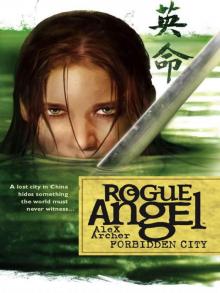 Rogue Angel: Forbidden City
Rogue Angel: Forbidden City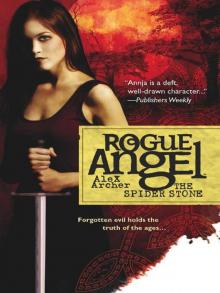 The Spider Stone
The Spider Stone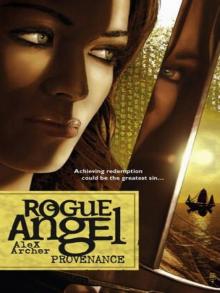 Provenance
Provenance Blood Cursed
Blood Cursed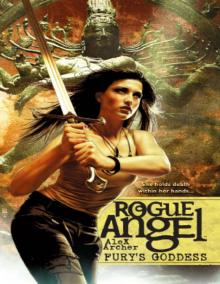 Fury's Goddess
Fury's Goddess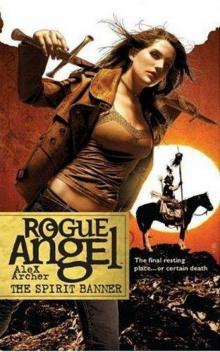 The Spirit Banner
The Spirit Banner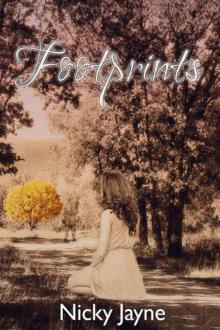 Footprints
Footprints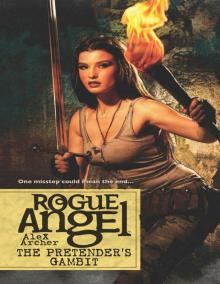 The Pretender's Gambit
The Pretender's Gambit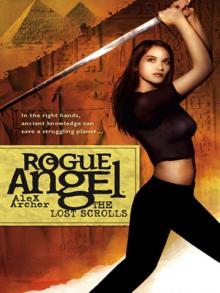 Rogue Angel: The Lost Scrolls
Rogue Angel: The Lost Scrolls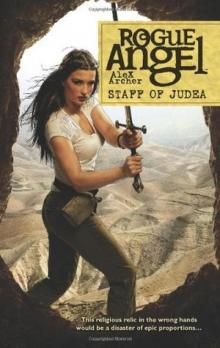 Staff of Judea
Staff of Judea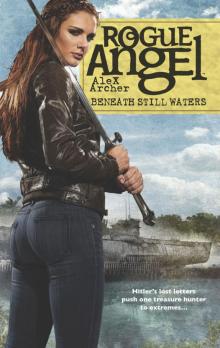 Rogue Angel 55: Beneath Still Waters
Rogue Angel 55: Beneath Still Waters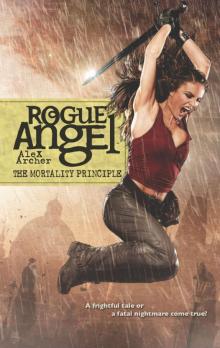 The Mortality Principle
The Mortality Principle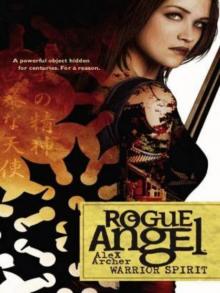 Warrior Spirit
Warrior Spirit Paradox
Paradox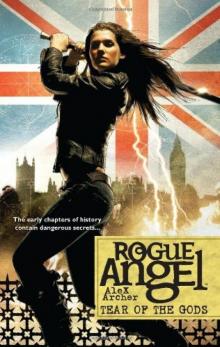 Tear of the Gods
Tear of the Gods Forbidden City
Forbidden City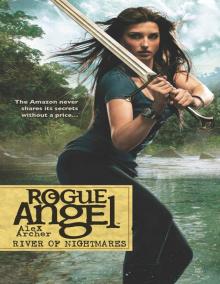 River of Nightmares (Rogue Angel)
River of Nightmares (Rogue Angel)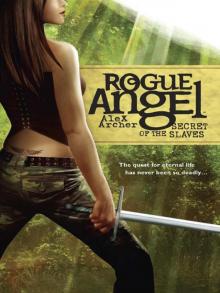 Rogue Angel: The Secret of the Slaves
Rogue Angel: The Secret of the Slaves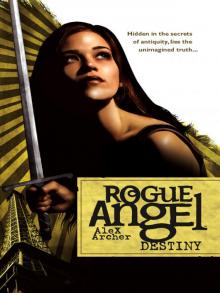 Destiny
Destiny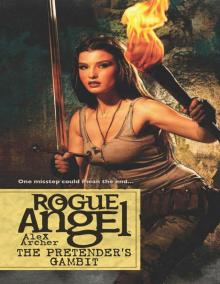 Rogue Angel 51: The Pretender's Gambit
Rogue Angel 51: The Pretender's Gambit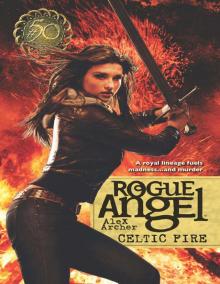 Celtic Fire
Celtic Fire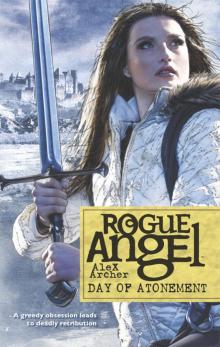 Rogue Angel 54: Day of Atonement
Rogue Angel 54: Day of Atonement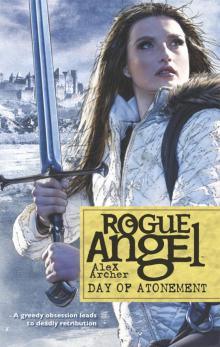 Day of Atonement
Day of Atonement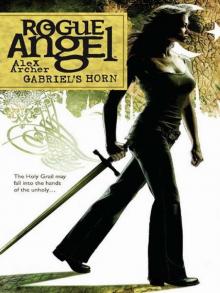 Rogue Angel: Gabriel's Horn
Rogue Angel: Gabriel's Horn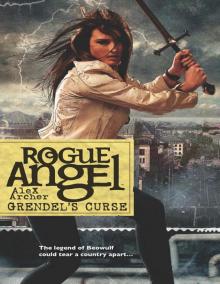 Grendel's Curse
Grendel's Curse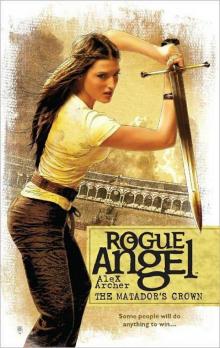 The Matador's Crown
The Matador's Crown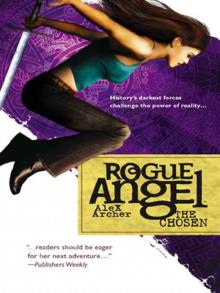 Rogue Angel: The Chosen
Rogue Angel: The Chosen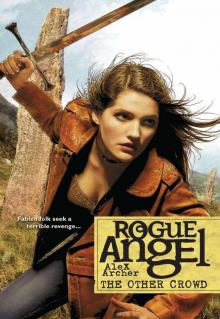 The Other Crowd
The Other Crowd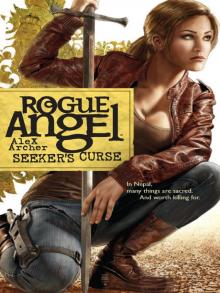 Seeker’s Curse
Seeker’s Curse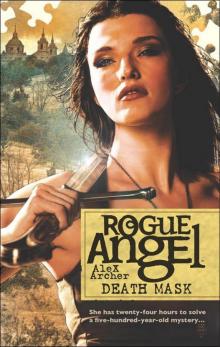 Rogue Angel 52: Death Mask
Rogue Angel 52: Death Mask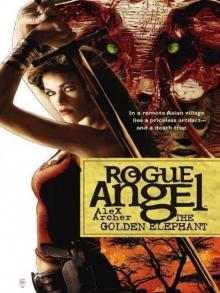 The Golden Elephant
The Golden Elephant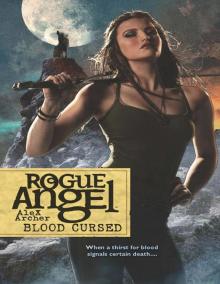 Blood Cursed (Rogue Angel)
Blood Cursed (Rogue Angel)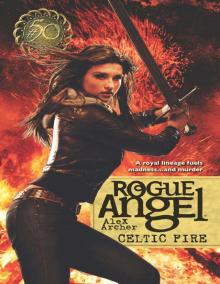 Celtic Fire (Rogue Angel)
Celtic Fire (Rogue Angel)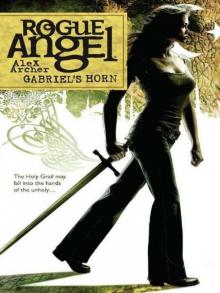 Gabriel's Horn
Gabriel's Horn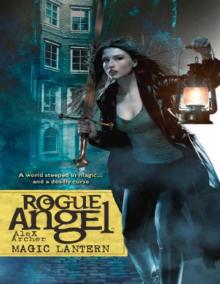 Magic Lantern (Rogue Angel)
Magic Lantern (Rogue Angel)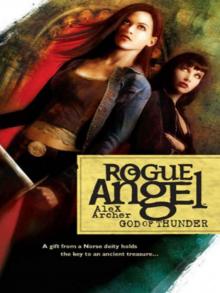 God of Thunder
God of Thunder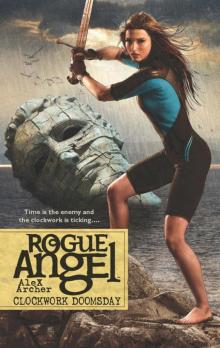 Clockwork Doomsday
Clockwork Doomsday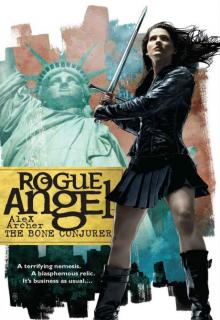 The Bone Conjurer
The Bone Conjurer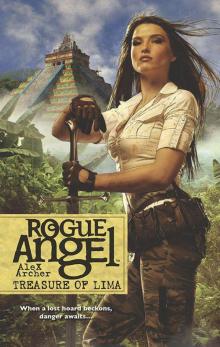 Treasure of Lima
Treasure of Lima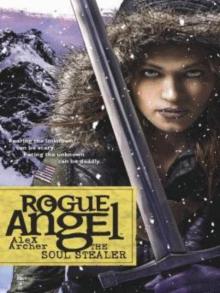 The Soul Stealer
The Soul Stealer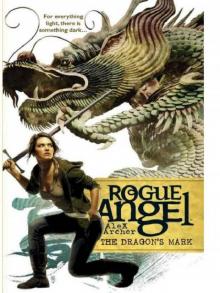 The Dragon’s Mark
The Dragon’s Mark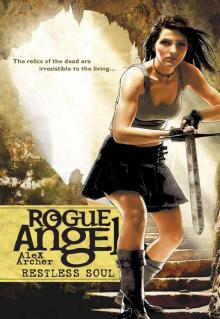 Restless Soul
Restless Soul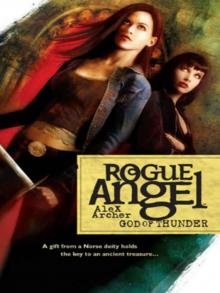 Rogue Angel: God Of Thunder
Rogue Angel: God Of Thunder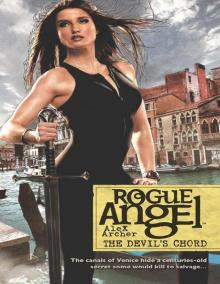 Rogue Angel 49: The Devil's Chord
Rogue Angel 49: The Devil's Chord Death Mask
Death Mask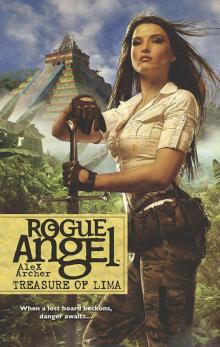 Rogue Angel 46: Treasure of Lima
Rogue Angel 46: Treasure of Lima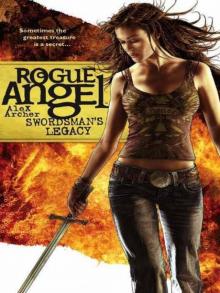 Swordsman's Legacy
Swordsman's Legacy The Oracle's Message
The Oracle's Message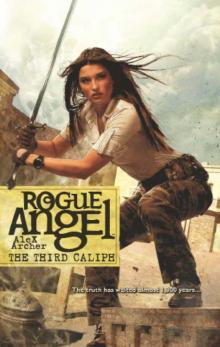 The Third Caliph
The Third Caliph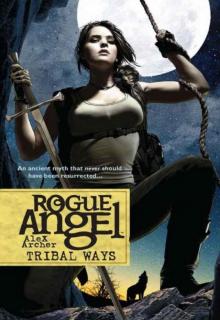 Tribal Ways
Tribal Ways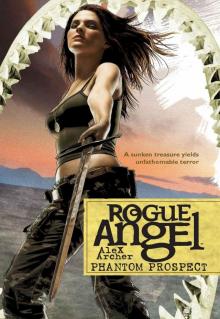 Phantom Prospect
Phantom Prospect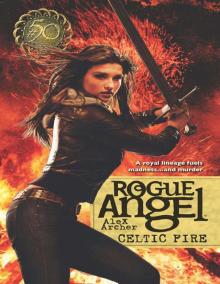 Rogue Angel 50: Celtic Fire
Rogue Angel 50: Celtic Fire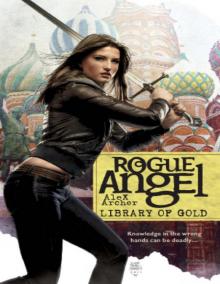 Library of Gold
Library of Gold Rogue Angel 53: Bathed in Blood
Rogue Angel 53: Bathed in Blood Sacred Ground
Sacred Ground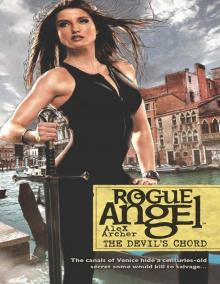 The Devil's Chord
The Devil's Chord Serpent's Kiss
Serpent's Kiss The Vanishing Tribe
The Vanishing Tribe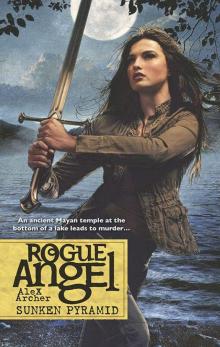 Sunken Pyramid
Sunken Pyramid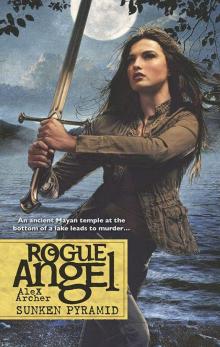 Sunken Pyramid (Rogue Angel)
Sunken Pyramid (Rogue Angel)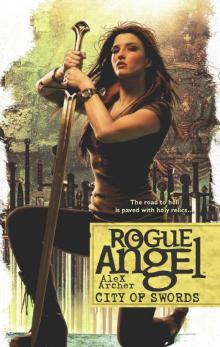 City of Swords
City of Swords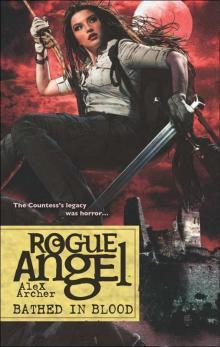 Bathed in Blood
Bathed in Blood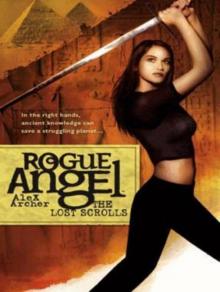 The Lost Scrolls
The Lost Scrolls The Babel Codex
The Babel Codex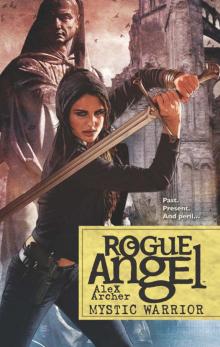 Mystic Warrior
Mystic Warrior Eternal Journey
Eternal Journey Beneath Still Waters
Beneath Still Waters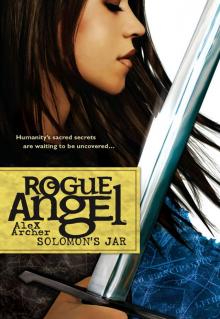 Solomon's Jar
Solomon's Jar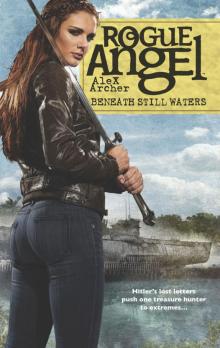 Beneath Still Waters (Rogue Angel Book 55)
Beneath Still Waters (Rogue Angel Book 55) Cradle of Solitude
Cradle of Solitude Secret of the Slaves
Secret of the Slaves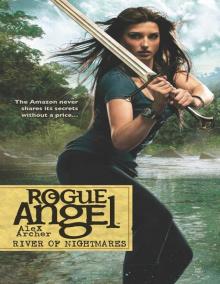 River of Nightmares
River of Nightmares Polar Quest
Polar Quest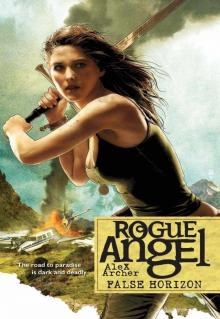 False Horizon
False Horizon